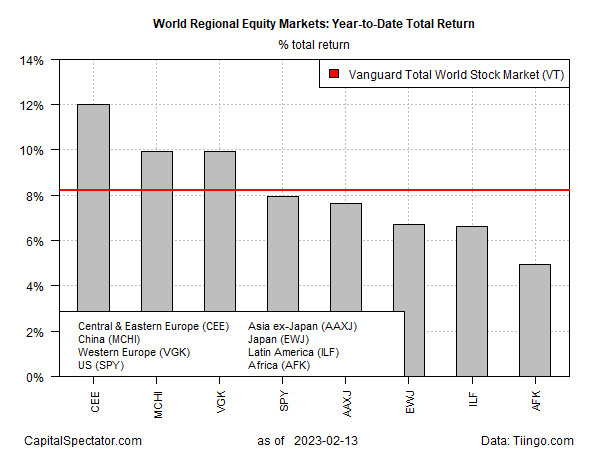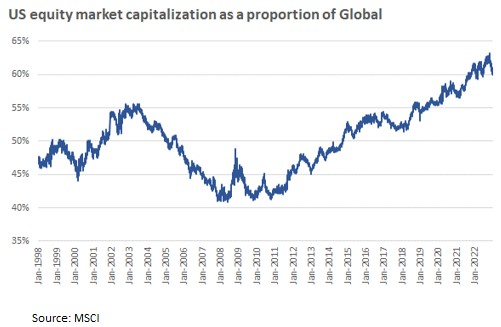Diversifying into global markets ex-US has been a frustrating choice for asset allocation for much of the past decade. Standard portfolio theory recommends holding an international mix of shares.
Still, the advice has been a dud in recent memory as US stocks have dramatically outperformed broad measures of offshore securities. But the rally in foreign stocks so far in 2023 suggests the tide may finally be turning in favor of global investing strategies.
Notably, two flavors of European equities are well ahead of US shares year to date. A month or two of outperformance could be noise, of course, and so the jury’s still out on whether the American stocks are set to play second fiddle to foreign shares in the years ahead.
Claims that foreign stocks were set to outperform have come and gone several times in recent years, only to see US stocks continue to lead. But by some accounts, raising non-US weights is timely.
The “era of ‘diversification’ has come to an end,” advises Andrew Okrongly, director of portfolios at WisdomTree, a fund manager.
“With an evolving macro backdrop and a renewed focus on balance sheet strength, margin resilience, and the ability to return capital via dividends, diversification across both regions and factors may once again prove critical in generating enhanced returns.”
Analysts at Pimco, another fund manager, forecast that the worst has passed for stocks in emerging markets.
“Despite a confluence of unprecedented shocks, emerging markets have shown resilience, with few signs of a broad-based crisis. As an asset class, EM appears to be positioned for stronger performance.”
So far in the new year, Europe is the leader. Central and Eastern Europe Fund (CEE), a closed-end fund, tops our list of foreign-market proxies via a 12% year-to-date gain.
China (MCHI) and a western-Europe portfolio (VGK) are essentially tied for second with roughly 10% year-to-date rallies.

Notably, a global proxy for shares — Vanguard Total World Stock Index Fund (VT) – is slightly ahead of US stocks (VTI) so far this year.
There are reasons to be cautious, of course, as the planet faces a number of risks that could create headwinds for foreign stocks relative to US shares. The war in Ukraine, in particular, remains a threat to Europe.
But some analysts say that the outsized returns in US stocks in recent years warrant a rebalancing of portfolio allocations. American shares as a percentage of global equities market capitalization have surged over the past decade.

Raina Oberoi, global head of equity solutions research at MSCI, said,
“When one country dominates a global portfolio to such an extent, that is something worth doing further research on. Market cap proportions and valuations alone do not signal bubbles, but they can be warning signs.”
